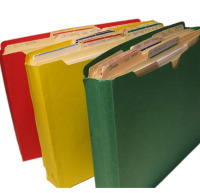Can a Book Hold a Lifetime of Stuff?
Nan Barnes
Wow, you have a lot! A lifetime of stuff, and your parent's stuff, too. You’ve been researching your genealogy a long time, have you? Recently, Carol Davis wrote me an email, "My first goal is to have my collection cleaned up enough if so I drop dead tonight I will not have to listen to my family moan and wail because they do not know what in the world to do with what I have. They would not toss it, but I would know truly how they feel about me if that happened. More to the point, this is my mess and mine to straighten up." I replied, “Carol, believe me, you're not the only one with this problem.”
Carol, like many genealogists, wants to leave a family history book as a legacy to her family. They may never be interested in “the whole mess”, but they will treasure a book, one that contains her most important knowledge, and one that was written for them.
Here's a way to think about sorting through your “stuff” that may speed up the process and make it more manageable. What if you consider all your stuff, and put it into two categories: digital and print. Not the form it's in now, but whichever form would be the best outcome. For example, anything that's strictly factual can be stored as digital, database information, and therefore it is easily preserved and can be archived for later. Consider that family members can step in and complete this work for you most easily. You can feel safe about putting that factual digital information on the back burner while you deal with the rest.
The second category contains anything that is wonderful to look at and handle, like documents and photos. Many are suitable for a print project - and they are also more fragile and likely to be lost if anything happens to you! These are your most important artifacts. Most likely, they need you and your memories to explain them and bring them to life. After all, what does your family care about? You, and your memories.
Now, these objects can now also be sorted into two categories: worthy of a book project, or not. You may have one or more, even several, book projects in mind. Select and scan all the essential, book worthy stuff first.
 Then scan the other, secondary stuff that won't go into one of your book projects and so will remain digital. Make folders of all those scans, grouping them simply by topic or period. That way, someone else can make sense of them if anything happens to you.
Then scan the other, secondary stuff that won't go into one of your book projects and so will remain digital. Make folders of all those scans, grouping them simply by topic or period. That way, someone else can make sense of them if anything happens to you.
Next comes the fun part: narrowing down your first book project so that it doesn't overwhelm you. Instead of throwing in the whole kitchen sink (or your whole family history) into one book, look at your best scans, and think about what's most important for you to say, and for your family to hear after you've gone. For this first time out, limit yourself to a small book. Cover just four generations, instead of twelve. One do just one branch of the family. Why a smaller project? Because you will finish it.
Write the book simply, in your natural voice, and tell your stories. Utilize lots of the scanned images of your precious family artifacts. This way, you don't have to write as much text and the book will be move along more quickly, because the pictures will help to tell the story. You can always supplement the book with a CD, if you want to include more stuff, without taking the time to write a longer book.
Remember, you’re trying to finijsh this pproject before you “drop dead”. To do that, you need to set a deadline, say within a year, and work on the book exclusively – expect to giveup your research time until you're done!
This method will also allow you to publish quickly, and to get that book into your family’s hands. They will be delighted! And they will want more. After all your hard work, they will still want more, because what does your family care about? You, and your memories. So, you put one book into their hands, satisfying your original goal, and if your hurry, you’ll live long enough to do another family history book. Even as you write your first, you can plan the second to include the things you didn't get to cover in the first. You'll be more experienced the second time around, and the process will be easier, so the second can be a bigger book.
But first, start with an easy, smaller project, and finish it. You know what they say... "A bird in the hand is worth two in the bush."